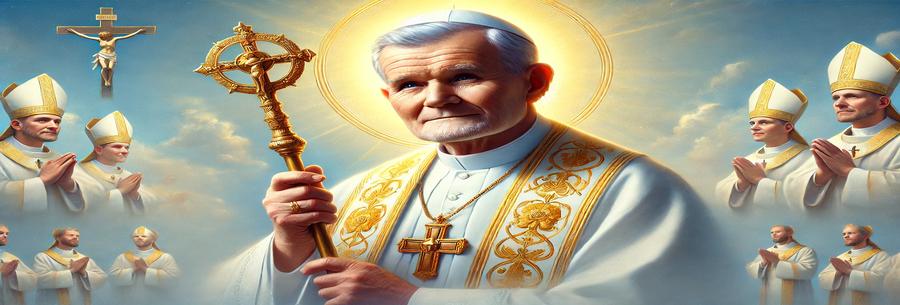The life of John Paul II, born Karol Józef Wojtyla, is marked by an extraordinary combination of faith, leadership and commitment to human rights. John Paul II is widely recognised as one of the most influential and charismatic popes in the recent history of the Catholic Church, and his pontificate has left a lasting imprint on the world.
Youth and Formation:
Karol Wojtyla was born on 18 May 1920 in Wadowice, Poland. His childhood and adolescence were marked by tragedy, with his mother dying when he was still young, followed by the deaths of his older brother and his father. These experiences had a profound influence on his faith and religious vocation. He studied philosophy at Krakow's Jagiellonian University and theology at the Krakow seminary.
Priest and Bishop:
Karol Wojtyla was ordained a priest in 1946, and obtained a doctorate in theology in 1948. He went on to teach philosophy and moral theology. In 1958 he was appointed Auxiliary Bishop of Krakow, and in 1964 he became Archbishop. His defence of human rights and his resistance to the Polish Communist regime made him an emblematic figure of Catholic dissidence in Poland.
Pontificate:
On 16 October 1978, Karol Wojtyla was elected Pope and took the name John Paul II, becoming the first non-Italian Pope in 455 years. His pontificate lasted almost 27 years, making it one of the longest in the history of the Church. During his reign, he travelled more than any other pope in history, visiting 129 countries and meeting millions of faithful from around the world.
Ecumenical and Interreligious Commitment:
John Paul II worked to improve relations between the Catholic Church and other Christian denominations, as well as with other religions. He met with religious leaders from around the world, including Jewish and Muslim leaders, with the aim of promoting mutual understanding and inter-religious dialogue.
Role in the Fall of Communism:
One of the most striking aspects of his pontificate was his role in the fall of Communism in Eastern Europe. His visit to Poland in 1979 encouraged the Solidarity movement, and he continued to support movements for democracy throughout the region. The Polish communist regime saw him as a threat to its authority.
Doctrinal Positions:
John Paul II was a conservative pope on doctrinal issues, opposing abortion, contraception, women's ordination and other progressive reforms. However, he also defended human rights, human dignity and social justice.
Assassination and Health:
On 13 May 1981, John Paul II survived an assassination attempt by a Turkish sniper in Rome. His rapid recovery was considered a miracle by many of the faithful. Over the years, he suffered from various health problems, including Parkinson's disease, but continued to perform his duties until his death.
Beatification and Canonisation:
After his death on 2 April 2005, John Paul II was beatified in 2011 and canonised in 2014, recognising him as a saint by the Catholic Church. His canonisation was one of the fastest in the history of the Church.
The life and pontificate of John Paul II were marked by his dedication to the Catholic faith, his commitment to human rights, his contribution to the fall of Communism and his influence on the Church and the world. His legacy remains a subject for discussion and reflection for many generations to come, and he continues to inspire thousands of people around the world.




















